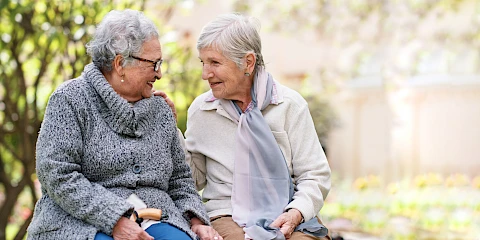
Social wellness is a critical aspect of overall well-being, particularly for seniors. It involves maintaining healthy relationships, having a support network, and engaging in meaningful social activities. Caregivers must create a deliberate social wellness plan for seniors in their care. We're here to guide caregivers in involving seniors in creating their social wellness plan.
Social Wellness for Seniors: The Basics
Social wellness encompasses several components, including forming and maintaining connections, interacting positively with others, and participating in social activities. For seniors, the benefits of social wellness are far-reaching. It can improve mental health by reducing feelings of loneliness and depression and potentially stave off cognitive decline. Physical health can also improve, as social engagement often motivates seniors to stay active. Overall, social wellness enhances their quality of life.
However, many seniors face social challenges such as isolation, limited mobility, or losing loved ones, which can hinder their social engagement. Recognizing these challenges is the first step toward offering effective support.
The Importance of Involving Seniors in the Planning Process
It's vital to involve seniors at every step of the process. It ensures that the plan addresses their specific social needs and preferences. No two seniors are alike, and a personalized plan will be more engaging for them. Involving them also reduces resistance and increases acceptance of the plan. When seniors feel they have a say, they are more likely to participate willingly. Finally, empowering seniors to take an active role in their well-being fosters a sense of control and independence. This can be particularly meaningful for them.
Starting the Conversation
Choose a time when both you and the senior are relaxed and not distracted. A calm setting can make the discussion more open and less pressured. Use open-ended questions to explore their social interests and needs. Ask questions like, "What activities do you enjoy doing?" or "Who do you like spending time with?" This encourages them to share their thoughts and feelings.
Active listening is key. Validate their feelings and concerns, showing empathy and understanding. This can build trust and make them more open to a social wellness plan.
Addressing Reluctance and Resistance
It's natural for seniors to show reluctance or resistance. They may fear new social situations, discomfort, or lack of interest in social activities. Identifying these reasons helps in addressing them effectively. Offer gentle encouragement and reassurance. Explain the benefits of social engagement and how it can enhance their quality of life. Sometimes, suggesting small, manageable steps can make a big difference. For instance, a short visit to a friend or a virtual chat can gradually build their confidence.
Creating a Tailored Social Wellness Plan
Once the conversation is underway, work together to identify social activities that align with their interests. This could include joining a book club, attending community events, or regularly visiting friends and family. Incorporate a mix of social activities. Group events foster a sense of community, one-on-one interactions build deeper connections, and virtual options can be a good starting point for those hesitant to leave home.
Set realistic and achievable goals for social engagement. These could range from attending one social event per week to making a phone call to a loved one every few days. Goals should be attainable and motivating, not overwhelming.
Implementing and Adjusting the Plan
Once the plan is in place, monitor progress and adjust as needed. Keep the lines of communication open and encourage feedback. This helps tweak the plan to better suit their evolving preferences and needs. Acknowledge these achievements, whether it's making a new friend or attending a social event. Also, any challenges should be addressed promptly to keep the senior motivated.
Stay Connected With Senior Helpers
Caregivers, it's time to start the conversation. Involve your seniors in this process to create a plan that truly benefits them. For personalized support, including friendly companion care, meal preparation, and transportation to and from important engagements, contact us at Senior Helpers Baltimore. We proudly serve Baltimore, Annapolis, Columbia, Baltimore County, and the greater Howard County area, and we're here to assist you at every step.